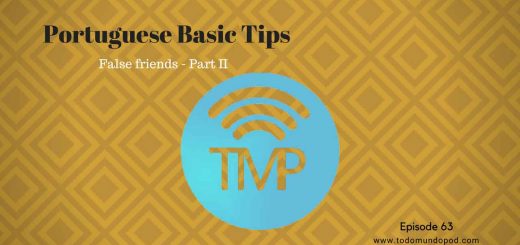False cognates (Portuguese x English) – Words that may confuse you in conversations

False cognates – Portuguese x English
Hello and welcome to our Portuguese Basic Tips 62 (in Englsih) about false cognates
On today’s podcast, we’re going to go over the false cognates or false friends. They are words that have similarities between two languages, but their meanings are completely different from one language to another. This may confuse you in daily conversation in Portuguese, that’s why they’re called ‘false friends”- so we’ll try to explain the main false cognates between Portuguese and English.
Visit our previous episode about Brazilian accents
We have lots of false cognates between the two languages and of course it would be impossible to speak about all of them in just one episode. So I’ll split this podcast in two parts, so that we can understand the expressions with more details.
Enough with that: let’s get started.
Assumir x to assume
You know, in English, when you say something as “I assume he did that”, you mean “I suppose he did that”, “I think he did that”. In Portuguese, if you say “eu assumo que ele fez isso”, you mean “I admit he did that”, “I confess he did that”.
This is very used in Portuguese by couples, for instance. You could say “Eu assumo que te amo”, which means “I confess that I love you”, I can’t help it.
In Portuguese we also use the expression “assumir a responsabilidade” which means “to take responsibility”.
Actually x atualmente – Portuguese false cognates
Well, both are adverbs. However, that’s the only similarity we’ll find between the two. In English, when we say “actually”, we mean “in fact” or “as a matter of fact”.
In Portuguese, “atualmente” means “nowadays” or “currently”. For instance, I often say here that “we currently have more than one hundred episodes”. In Portuguese, we’d say “nós atualmente temos mais de cem episódios”.
Data x Data
Data, in English, you know, it has something to do with items of information, individual facts, statistics. In Portuguese we call it “dados”. Data is equivalent to “dados” in Portuguese. Data, in Portuguese, is a period of a time. For instance: this period we celebrate something / nesta data nós celebramos algo.
Eventually x Eventualmente
This one is very, very, very important for you to know! It’s pretty common for us to translate “eventually” as “eventualmente” in Portuguese. I see it all the time in Portuguese subtitles, for instance. They have different meanings, however.
In English, we use “eventually” when we want to say “finally” or “at last”, “in the end”, right?
In Portuguese, “eventualmente” means “sometimes”, “now and then”, “every once in a while”. I mean, this is something that not happens all the time. For instance: eventualmente, assisto aos jogos da Copa do Mundo/ Sometimes I watch the World Cup games.
Injury x injúria
In English, when we say that someone is “injured”, we mean that this guy is hurt or something, right? In Portuguese, the word “injúria” is something that someone says to offend someone else’s honor. For instance: “ele falou várias injúrias sobre mim”. That is something as “he said several insults about me”. Another example: “essas informações são injuriosas” / “This is a lie”.
Injúria is not necessarily a lie, but lies are often used to offend someone’s honor, right?
Become a premium Member to download our full transcripts
Lern more about this topic by clicking here (Portuguese only).
I hope you like it!
See you next time.
Thanks.
Marcos Sales
Podcast (portuguesebasictips): Play in new window | Download







1 Response
[…] Se você não ouviu o nosso episódio anterior sobre o tema, clique no link e visite o nosso podcast chamado false cognates part I […]